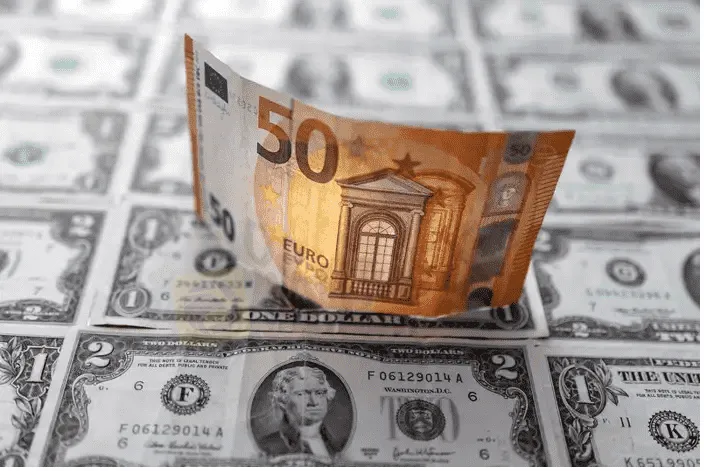简体中文
繁體中文
English
Pусский
日本語
ภาษาไทย
Tiếng Việt
Bahasa Indonesia
Español
हिन्दी
Filippiiniläinen
Français
Deutsch
Português
Türkçe
한국어
العربية
Euro hovers above parity before U.S. inflation data
Abstract:The euro hovered a whisker above parity on the dollar on Wednesday ahead of U.S. inflation data, with traders wary a sky-high reading could force it to lows not seen in decades.

The euro was hovering just above parity with the U.S. dollar on Wednesday while traders focused on U.S. data due later in the session that is expected to show inflation at a 40-year high.
European stock markets were in the red and currency markets were calm in early European trading, with the dollar index up by around 0.1% at 108.33.
The euro was down 0.2% on the day at 1.00375 at 0804 GMT.
On Tuesday, it had dropped as low as $1.00005 on the most widely used Electronic Broking Services (EBS) dealing platform and touched $1 on Reuters dealing overnight.
Market-watchers were focused on U.S. CPI data due later in the session. Economists forecast headline U.S. inflation accelerated to 8.8% year-on-year in June, a four-decade high.
But “core” CPI, which strips away volatile food and energy prices, is expected to repeat Mays 0.6% monthly increase and cool slightly to 5.7% year-on-year.
Higher-than-forecast inflation would reinforce expectations of Federal Reserve interest rate hikes and push the dollar higher – potentially causing euro-dollar to break parity, analysts said.
But traders will be looking for any signs of inflation having peaked, as this could potentially convince the U.S. central bank not to become more aggressive in its future rate hikes.
The euro is down nearly 12% this year and fell to a 20-year low on Tuesday, as the war in Ukraine has triggered an energy crisis that has hurt the continents growth outlook.
Germany has moved to stage two of a three-tier emergency gas plan and warned of a recession if Russian gas flows are halted.
“I see relative recession risks as the primary driver of the drop towards parity – Dutch gas futures are up 100% over the last month, U.S. gas futures are down 35%. This is a clear negative for euro zone growth and is dragging the euro lower,” said Colin Asher senior economist Mizuho.
Derek Halpenny, head of research at MUFG, said in a client note that risk-off market moves due to increased global recession risks have “further to run”.
“We doubt that is the end of the move and see little reason for the US dollar to turn weaker at this juncture,” he said.
The euro was down by around 0.1% versus the British pound, with the euro-sterling pair having fallen 2% so far this month.
“The markets treating the euro zone as worse off than the UK when it comes to the gas flow,” said Jordan Rochester, FX analyst at Nomura.
The pound was up 0.2% versus the dollar at $1.19055.
Britains economy expanded unexpectedly in May, driven by a rise in local doctor appointments and growth in other sectors although consumer-facing services fell slightly as inflation mounted, according to official figures.
The Japanese yen was a touch lower versus the U.S. dollar at 127.075, having taken a beating in recent months due to the Bank of Japans ultra-easy monetary policy making it an outlier among major global central banks.
The Australian dollar – seen as a liquid proxy for risk appetite – was up 0.2% at $0.67700.
The New Zealand dollar was up 0.1% at $0.6134, having taken little support from a 50 bps interest rate hike by the countrys central bank.


Disclaimer:
The views in this article only represent the author's personal views, and do not constitute investment advice on this platform. This platform does not guarantee the accuracy, completeness and timeliness of the information in the article, and will not be liable for any loss caused by the use of or reliance on the information in the article.
Read more

Oleg Mukhanov Steps Down as TradingView CEO Amid Leadership Shakeup
In a surprising announcement on Thursday, Oleg Mukhanov, who has been at the forefront of TradingView’s growth over the past few years, revealed his decision to step down as CEO. Mukhanov, who ascended to the role in January 2024 after joining the technology giant in mid-2022 as Group Chief Financial Officer, will continue to serve as an advisor to TradingView’s board.

Deutsche Bank Facing Record Fine from German Watchdog – What’s the Price
Germany's watchdog imposed a EUR 23.05 million penalty to Deutsche Bank AG for violating several regulatory requirements under German law. According to the Authority, the company breached organisational requirements under the German Securities Trading Act in connection with the sale of derivatives. In addition, its Postbank branch disregarded the obligation to record investment advice and repeatedly failed to comply with the requirements of the German Payment Accounts Act regarding the account switching service.

The Hidden Tactics Brokers Use to Block Your Withdrawals
In the fast-paced world of online trading, liquidity is everything. Traders and investors must have unrestricted access to their funds at all times. Any broker that imposes unnecessary conditions or delays when it comes to withdrawals is raising a glaring red flag.

Forex Trading: Scam or Real Opportunity?
Meta: Explore forex trading: Is it a scam or real opportunity? Learn how it works, debunk myths, manage risks, and avoid scams with tools like WikiFX App. Start trading safely today!
WikiFX Broker
Latest News
Forex Trading: Scam or Real Opportunity?
The Hidden Tactics Brokers Use to Block Your Withdrawals
Deutsche Bank Facing Record Fine from German Watchdog – What’s the Price
Oleg Mukhanov Steps Down as TradingView CEO Amid Leadership Shakeup
Currency Calculator






